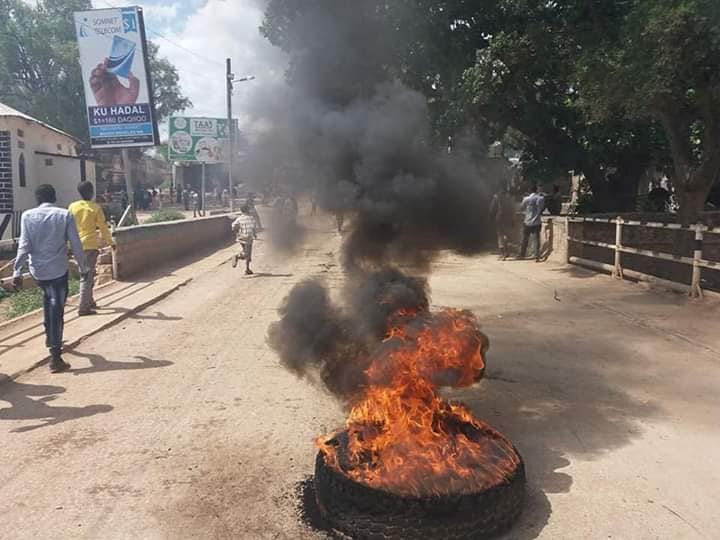
Burning tire during protests following Robow’s detainment
Ethiopian forces, in coordination with Somali police, detained former al-Shabaab senior leader and Southwest (SW) regional presidential candidate Mukhtar Robow in Baidoa and transported him to Mogadishu on accusations of being a “security threat”.
In a statement, the Federal Government of Somalia’s (FGS) Ministry of Security accused Robow of failing to renounce his extremist past, illegally importing weapons, and mobilizing his militia ahead of the SW presidential election on December 19.
Many observers say that Robow’s detention will make him a martyr and improve his chance of electoral victory among the SW parliamentary electors – if he’s allowed to inevitably contend.
No Election Delay?
The SW election commission published a press release stating there would not be a delay in the SW election, which has already been postponed three times.
This is surprising because the original and reconstituted commissions both approved Robow as a candidate. So, if there was proof he violated electoral rules, as the FGS essentially alleges, then the commission should highlight these as grounds for decertification rather than press forward without addressing the matter directly.
The commission also does not appear to be taking into account the insecurity that has erupted in Baidoa. Following Robow’s detainment, gunfire was exchanged between Robow’s militia and Ethiopian and Somali forces in Baidoa that resulted in 8 dead and 10 injured, according to VOA. See footage from the unrest in Baidoa below:
Unless the row with Robow is resolved, maintaining the timeline for the SW election could lead to further violence.
FGS Interference and AMISOM Neutrality
Robow’s detainment is a problematic escalation of FGS efforts to undermine opponents of the government-backed choice for the SW presidency in former Energy Minister Abdiaziz Hassan Mohamed “Lafta Gareen” — who has failed to gain momentum for his campaign.
· Previously, the FGS “disallowed” Robow from contention in a press statement that was disregarded by the SW election commission;
· Five former SW candidates have dropped out of the race to support Robow;
· Lafta Gareen has allegedly run into trouble recruiting local political and financial support from clans and businessmen.
Somali federal parliamentarians argue that the whole scheme – leveraging foreign troops to detain a political rival without charges – highlights the grounds for impeachment against President Mohamed Abdullahi Mohamed “Farmaajo”. While there are still legal obstacles that prevent impeachment, Farmaajo’s critics are correct to point out the FGS cannot rule by press statement and simply hold Robow in legal purgatory — as they do with Sheikh Hassan Dahir Aweys. From a rule of law perspective, the FGS has three options:
1) Press Robow with civil or criminal charges and allow him to face court;
2) Allow Robow to proceed as a candidate as certified by the SW election commission
3) Debate and pass an amnesty bill that outlines the road to restitution for former and future terrorist defectors
The involvement of Ethiopian forces in Robow’s detainment highlights how AMISOM is often pulled into a non-neutral positions during political disputes in Somalia. During the regional state formation processes, AMISOM leadership promised to stay neutral during deliberations. But, Kenya and Ethiopia in particular took actions that clearly benefitted specific elites who supported their respective agendas — forfeiting any notion of neutrality.
Notably, an unknown number of Ethiopian troops are in Somalia as part of a separate bilateral “agreement” between Ethiopia and Somalia, rather than as part of AMISOM. There is no easy way to distinguish these troops from each mission. In any case, recent developments will harm AMISOM’s reputation because Ethiopia’s actions represent further evidence that its troops continue to act outside of rules, regulations, and pledges from AMISOM as a nominal peacekeeping authority.
It is always said that these crises prevent the FGS and regional leaders from addressing the most important priorities such as revising the constitution, consolidating security forces, and preparing for national elections in 2020-21. This remains true.
It should be noted that this week, the Ministry of Constitutional Affairs and Ministry of Finance co-hosted a working session on “Federal Fiscal Models in the Context of the Constitutional Review Process.” However, it does not appear that regional representatives were included in the meeting, and they are unlikely to even seek participation in the future unless the FGS can repair its reputation as an election meddler and distrusted partner in governance.
Categories: Southwest

 Allegations of Interference Jeopardize Somalia’s Regional Elections
Allegations of Interference Jeopardize Somalia’s Regional Elections
Leave a comment